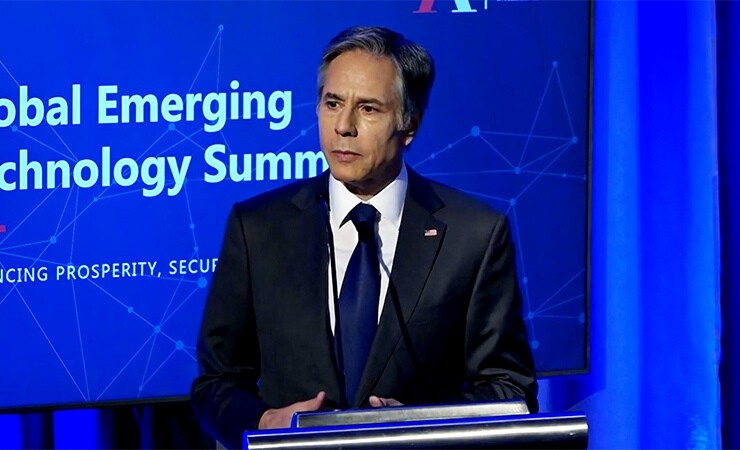
Secretary of State Tony Blinken addressing the Global Emerging Technology Summit convened by the National Security Commission on Artificial Intelligence on July 13.
(Image credit – NSCAI)

Secretary of State Tony Blinken addressing the Global Emerging Technology Summit convened by the National Security Commission on Artificial Intelligence on July 13.
(Image credit – NSCAI)
Addressing an international conference
Much of the current wave of attention in Congress and the Biden administration surrounding R&D, technology, and supply chains is driven by concerns about the rising technological influence of rival nations, and especially China. However, Blinken argued it is not enough to “highlight the horrors of techno-authoritarianism.” He said the U.S. must instead establish an alternative model of governance for AI and other emerging technologies that embodies democratic nations’ common values.
“Democracies have to pass the tech test together. And diplomacy, I believe, has a big role to play in that,” he continued, saying that building up the State Department’s technology diplomacy capabilities and weaving them throughout U.S. foreign policy is one of his top priorities.
In his address, Blinken said that technological cooperation among democracies will be accomplished through the accumulation of piecemeal agreements. He remarked,
Our goal is strong networks — plural — of countries, companies, universities connected by shared values and a shared commitment to design and deploy technology for the benefit of all people, to strengthen open and interoperable systems, to encourage freedom of thought and expression, which are the heart of innovation, to defend each other against those who are intent on taking technologies that could be used for good and using them for harm.
He also noted the U.S. has recently entered into bilateral agreements on scientific cooperation and emerging technologies with the UK
Blinken reiterated the Biden administration’s interest in building more resilient supply chains for critical technologies
More concretely, Blinken and other administration officials signaled that a number of specific policy actions are forthcoming. “We’re taking a fresh look at tools like export controls, investment screening, and visa screening, to make sure our strategic competitors are not exploiting our own innovative ecosystems to gain military or national security advantage,” Blinken said. Currently, the Commerce Department is gearing up
Outside of such technical matters, Blinken also stressed the importance of establishing international norms for the ethical use of emerging technologies, arguing, “If they’re going to be used as part of our national defense, we want the world to have a shared understanding of how to do that responsibly, in the same way that we’ve hammered out rules for how to use conventional and nuclear weapons. That’s how we reduce the risk of proliferation. It’s how we prevent escalation or unintended incidents.”
For the U.S. to meet its diplomatic goals, Blinken said the State Department will have to significantly expand its technological capacity. “Virtually everything on our agenda has some tech or science or innovative component to the solution. We need to do a better job bringing that knowledge, that expertise, that focus into the department and to everything we do,” he remarked.
Reflecting on his previous tenure at the State Department during the Obama administration, Blinken said,
Part of the problem is that many of us who are engaged in these issues are not brought up on these disciplines. … It’s not our first instinct. And I got to the point when I had the responsibility of chairing some of these meetings to thinking that I needed scientists and technologists in the room just to tell me whether I needed scientists and technologists in the room to help identify the problems and help identify some of the solutions.
However, asserting more comprehensive efforts are necessary, he reported that he has asked deputy secretaries of state Wendy Sherman and Brian McKeon to provide recommendations on how to “elevate and institutionalize” cyber and technology capabilities across the department. “We’ll make sure the State Department is organized for the task at hand, because the issues before us really bear little relationship to borders on a map or the current organizational chart of the State Department,” he remarked.
Blinken also committed to coordinating with Congress on measures to strengthen the department’s technological capacity. The U.S. Innovation and Competition Act
Looking forward, Blinken said, “I intend to leave my successor at the State Department with strong capabilities in cyber and tech diplomacy, with clear leadership, lines of authority, organizational homes, and talent at every level. We need to become much better at anticipating the foreign policy implications of the next wave of innovation, and the wave after that. I want to shape the strategic tech landscape, not just react to it.”